A Classical Christmas
Three Messiahs, One Liszt, And A Bach...
The English Concert and Choir, John Nelson - Handel Messiah (Erato, 2024)
American conductor John Nelson has finally recorded his Messiah. It is a sensible, transparent, and wholesomely reconsidered reading of Handel’s masterpiece where Nelson placed a greater emphasis on the performance as guided by his quick and studied mind and not on the mountain of scholarship that has dictated performance practice for the past 40 years. That intense study provided important recordings, revealing much about the composer’s considerations from on performance to the next.
Rather than choosing a specific performance directed by Handel, Nelson and the orchestra preferred to work within several of the performance variants, most notably Handel’s original autograph (1741), changes Handel made for the first performances in Dublin (1742), and substitutions made for the London revivals in 1745, 1749, and 1750. Most notable in these performances is a new alto setting of “But who may abide” originally written for the famous castrato Gaetano Guadagni (1728-1792) to show off with in the 1750 London performances.
Nelson collects a veteran group of soloists, with favored tenor Michael Spyres and bright countertenor Alex Potter. Both men have a well-balanced, agile tone. Soprano Lucy Crowe is emotively expressive, delivering a rivetingly tender “I know that my Redeemer liveth.” Bass Matthew Brook brings great gravity to all in which he sings. Nelson deftly directs Trevor Pinnock’s English Concert, governing them closely to allow full realization of the soloist. Tonally secure and judiciously managed, the orchestra exists as the perfect support to realize this exceptional performance.
Nelson breathes a robustness and vigor into this performance scarcely matched by earlier recordings. This, then, is a no-nonsense yet consistently interesting and invigorated Messiah, aided by a well-made recording, that should be both easy and rewarding to live with. The compact disc comes with bonus material as alternative arias and choruses gathered from differing versions of the piece, from the original 1741 manuscript through the Dublin premiere and subsequent performances in London up to 1750. These alternate versions reveal the heart of Handel.
Innsbrucker Festwochenorchester, Alessandro De Marchi - Il Messia (cpo, 2024)
Regarding Messiah recordings, it has been hard enough to follow all the changes and resulting manuscripts Handel made to the piece while he was conducting it. The oratorio still provides clues to its many charms in the performance interpretations made since the death of Handel in 1959. The history of the oratorio has been delt with elsewhere, but what the listener has here is something different. Messiah in than hands of future conductors, arrangers and orchestrators. Is this any less essential that all of Handel’s nervous niggling?
It is when the opening aria, “Comfort ye,comfort ye my people saith your God” sung by the soprano after an Italian reorchestration of the opening French overture, “Sinfony,” that it is apparent that this is not our parent’s Messiah. Performed in Florence 20 years after its Dublin debut (1742) presenting this reading in Italian that is exciting for its contemporary newness.
This manuscript represents the first European mainland performance of the piece and has a bit of history. In 2019, the Handel House foundation of Halle discovered an Italian version of Messiah in the collection of a private owner. When discovered, it was known that the oratorio was performed in Florence around 1770. Through careful diligence, researchers determined that this performance took place in the Palazzo Pitti 6 August 1768, using an ensemble of four vocal soloists, a choir of sixteen voices, nine violins, two violas, a cello, two double basses, two oboes, two natural horns, two trumpets, timpani, and organ.
Conductor Alessandro De Marchi, with director Coro Maghini and the Innsbrucker Festwochenochester, recreates this performance using original instruments, and a historically informed meter. Alessandro De Marchi changed from the original the oratorio, with director Coro Maghini and the Innsbrucker Festwochenochester, resulting in an exciting and vibrant event that will not be for purists but will satisfy those listeners wanting something different while remaining familiar.
Dallas Bach Society, James Richman- Handel Messiah (Onyx Classics, 2024)
Handel’s Messiah premiered in Dublin on Friday, April 13, 1742. Yet, the Dallas Bach Society claims their performance used the 1741 manuscript (based on a new edition created by noted musicologist Malcolm Bruno, based on the original 1741 score). Handel composed the oratorio in the 24 days between 22 August and 14 September 1741. The history of Messiah performance and recording has run the gambit of varying orchestra size, tempo, period performance, period instruments, and differing versions.
The Dallas Bach Society, meanwhile, performs with an orchestra of about two dozen—about the size Handel would have expected—performing on instruments deliberately built as replicas of the common instruments of the first half of the eighteenth century. The Dallas back Society’s performance is unabridged and led from the harpsichord by conductor James Richman, whose keen sense of timing and tempo allows the oratorio to blossom naturally, revealing a richly ornamented event filled with surprises, many startling so. This Messiah is a most pleasant surprise from a mostly locally known orchestra, choir, and soloists. This is a fine reading.
Wojciech Waleczek - Franz Liszt: Weihnachtsbaum (Christmas Tree) (Naxos, 2024)
By the time Hungarian pianist Franz Liszt composed the pieces in this collection, he had been the lover of the already married Countess Marie d’Agoult, fathering three children with her. When that relationship ended, Liszt hit the concert circuit, establishing himself as a virtuoso while helping Nicolo Pagannini establish “the Artist as equal to the composition. Liszt performed until 1848, when he was convinced by his then girlfriend Polish Princess Carolyne von Sayn-Wittgenstein to leave the road, becoming Kapellmeister for the Grand Duke Carl Alexander in Weimar. Finding that environment inhospitable, Liszt moved to Rome, taking minor religious orders from 1862 to 1867, after which he reemerged composing much solo piano music in his last decade.
These compositions included 28 published solo piano pieces and an additional 28 pieces that were unpublished. Seventeen of the unpublished compositions were secular, with the remaining, rarely performed or recorded, presented here by Polish pianist Wojciech Waleczek, a Naxos Records regular, who has contributed generously to its Liszt Complete Piano Music series. Included in this late period ephemera were the twelve miniatures Weihnachtsbaum (Christmas Tree). Divided into three sections, the first four pieces devoted to traditional carols, the second four addressing a child’s view of Christmas, and the final four, an adult view of the sacred day. This series reflects Schumann’s Scenes From Childhood and Debussy’s Children’s Corner in form and content. Waleczek approaches these pieces with a muted playfulness and quiet command, always reverent with a sparkle in its eye.
English Baroque Orchestra, Monteverdi Choir, John Eliot Gardiner - Bach: Christmas Oratorio (Deutsche Grammophon, 2024)
John Sir John Eliot Gardiner and The English Baroque Orchestra and Monteverdi Choir first released Bach’s Christmas Oratorio in 1987 (Archiv Produktion). As the conductor has gotten older, he has revisited some of his exceptional releases: Bach’s St. Matthew Passion (1988 and 2017), St. John Passion (1986 and 2022), Mass In B Minor (1986 and 2015), and Motets (1993 and 2019). These reconsiderations are very fine, providing an excellent comparison of Gardiner’s trailblazing recordings of the 1980s and his mature thinking.
This is a live recording taped from a concert presented in St Martin-in-the-Fields, London, in late 2022. The engineering and sonic here are superior to that experienced in the earlier recording. The opening Sinfonia establishes an ambience of pastoral memory that remains for the rest of the work. Gardiner's soloists are excellent, and the Monteverdi Choir and English Baroque Soloists perform with a calm, animated, and controlled style. This may be the finest performance of Bach’s masterpiece.
And this is a good thing because Gardiner and Dickey Betts both founded bands that fired them, sharing a dubious distinction. This performance may well be the last by the Monteverdi Choir and English Baroque Soloists and Monteverdi Choir with Gardiner at the helm. The grandeur of the performance makes it a fitting exit for Gardiner, who, at 81, is founding a new orchestra, the Constellation Choir and Orchestra and setting out for brighter climes. This should be interesting.



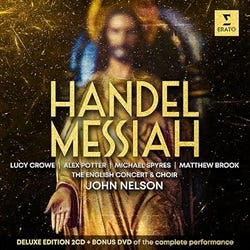
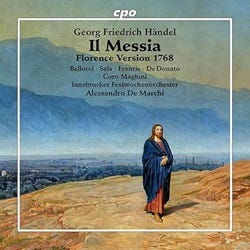
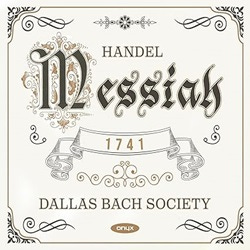
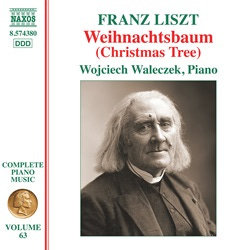
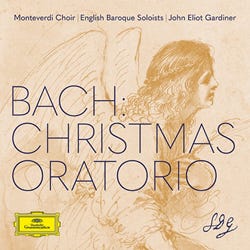
Does is get any better than The Messiah? Not seasonly, to be sure.
The Appasionata is in the running though.